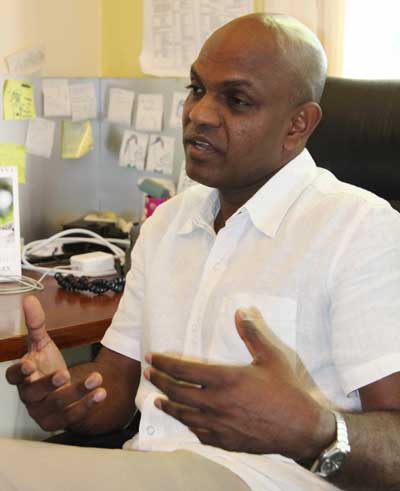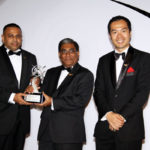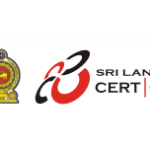WSO2 CEO Sanjiva Weerawarana stresses on the importance of proactively getting the local developer community to participate more in open source
By Cassandra Mascarenhas : http://www.ft.lk
A company in the forefront of the international middleware industry, WSO2 is a brand that has been rapidly gaining recognition both on a local and global scale in recent times and is continuing to surge ahead on this front.

WSO2 Chairman and CEO Sanjiva Weerawarana noted that although they do not market directly to Sri Lanka, they have been increasingly working with many local companies on enterprise software projects.
“We don’t see us advertising in Sri Lanka, we don’t market directly to the country. In fact we don’t advertise anywhere, just through the web. People find out information and Sri Lankans have a mindset that foreign is always better to a great extent so that’s one of the reasons we don’t advertise but we want people to come to us if they want our help. We have a better product and can beat anybody in the market but you need to convince yourself of that,” he stated confidently.
He added that while there is now a significant amount of brand awareness about WSO2 in Sri Lanka, there has been on the whole a significant uptake in awareness worldwide about the company and is always on the list of companies to look at or talk about.
Discussing some of the work WSO2 has undertaken with local companies, Weerawarana said that on a consumer level, the iPod touch checkout device currently being used by Odel runs through WSO2 software. It is essentially an iPhone app that allows the customer to scan their purchases and get the bill and while there is a component there to pay the bill, Odel at the moment uses a normal credit card device but later will enable customers to swipe their credit card through the other application. The loyalty programme that Odel launched recently also runs on WSO2 software.
Another company they have been working closely with is Keells Super, which uses SAP for their retail store management. “All the daily price updates and integration from each of the retail stores to their main SAP system, all their integration goes through our software. That’s something we’ve been working with them on for awhile, we started early last year and worked closely with them to get it up and running,” he explained.
The company is also working with one of Sri Lanka’s biggest telcos on some new products as well as with one of the most established banks in the country.
On some of the other projects WSO2 is working on this year, Weerawarana shared that they will be running the WSO2 conference this year as well, in either September or October. Another aspect they are focusing on is proactively getting the local developer community to participate more and more in open source.
“I set up the Lanka Software Foundation nearly 10 years ago in 2003 and that was primarily to help people to get the opportunity to contribute to open source projects. We run quite a lot of open source projects, we are widely known globally but we don’t have much local participation yet so that is if you are a developer working for another software company and you want to contribute and be a part of the developer community and technology development at WSO2, you can,” he said.
There is also an Apache conference that will take place in March, sponsored by WSO2, which will aim to get local developers to participate in other Apache projects and keep building people up.
Sri Lanka is a part of the Apache Software Foundation, the world’s most well-known open source development community and after the US and a couple of European countries, Sri Lanka is the next most proactive contributor.
“We’ve done a lot of work and we need to keep building on it. We can’t stop because the opportunities are very significant and we need to continue building on that.”
On the general open source front, looking at it globally, in the software industry there are two kinds of companies, the CEO said. Companies that have a technology set that can solve pretty much any problem that you have but WSO2 does not compete on that front. They are instead working with those vendors to use their software to build those applications.
“If you look at enterprise, anything you want to build for yourself, we can give you the tools for and there are only a few other companies in the world that can make that statement: IBM, Oracle and maybe Microsoft. We are in that very small league of companies who can offer the entire middleware stack that you need to build whatever you are trying to build. We are very unique in that way as we are the only open source player in that level of platform offering and that’s our competitive advantage on a global scale,” he added.
“People come to us because they are looking at large-scale problems, they have lots of stuff they want to do and we can offer them a complete platform. That’s working really well for us, it’s taken a long time but we’re getting there and we are now getting good recognition.”
Moving on to the topic of cloud computing, which in recent times has been much talked about, he said laughing that it’s almost as hyped up as the internet was.
Weerawarana explained that the internet was actually invented in 1969 although people think it was a 90s phenomenon which is wrong: the web was the 90s thing but it is just one application running on the internet and yet everyone thinks the internet is the web.
“Today it’s like you’re a Neanderthal if you are not on cloud. However there are some real aspects of the technology, one of which is virtualisation. If I have a computer, I could now use it virtually as if it’s many and share physical resources virtually. Again that concept is not new, IBM has had virtualisation on their operating systems for 50 years,” he revealed.
Today even a Rs. 50,000 machine is hardware virtualisation enabled and memory is so cheap, virtualisation is now everywhere.
Another aspect of cloud that matter is the concept of self-service. Earlier if an organisation wanted to get another server it took nearly six to nine months to set up. Self-service of IT is a very important advancement of cloud.
Then there is also this concept of elastic computing – the idea that computing is more like power in the cloud. It’s like how power systems work and having that elastic capability is very important for our lives, he noted. One no longer needs to pre-decide on what they want and can instead pay for what they use instead of pre-allocating everything needed.
“There are a few aspects of cloud computing like that and while they are not novel on a technology level, all the aspects have come together at a time to offer a nice packaging of technology and there is a real value proposition there; at an infrastructure, middleware and software level. There is a lot of hype there but there is a lot of reality in how technology is enabling you to be much more self serviced, elastic in terms of what you pay for, increase the overall productivity on your time and cost goes down because you pay for what you use,” he summed up. Computer technology, Weerawarana reminded, is only 100 plus years old. Looking at civil engineering, mechanical engineering, irrigation engineering – it’s thousands of years old.
“The digital computing era started only really just 50 to 60 years ago but yet it has completely rewritten our lives in every possible aspect. Yet because it is so young, it is completely immature. Every time you write a programme, you don’t know if it’s going to work but we are getting more and more to a point where digital computer technology is becoming more of a serious engineering discipline. There’s an interesting maturing process going on in the entire software and technology sphere,” he stated.
Pic by Kithsiri De Mel






GIPHY App Key not set. Please check settings